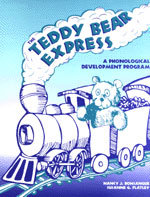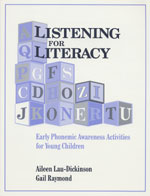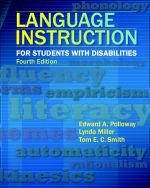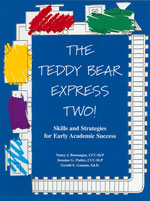 |
| >LANGUAGE INSTRUCTION FOR STUDENTS WITH DISABILITIES • Fourth Edition |
Edward A. Polloway
Lynda Miller
Tom E. C. Smith
This book is an essential text for teachers because of its extensive coverage of language development and linguistic diversity, and its practical strategies for teaching students with special needs.
The revision includes current research across the specific domains covered within the language area. Particular emphasis is placed on evidence-based practices that are also practical for classroom instruction. Individual chapters detail the nature of reading and its assessment, handwriting, spelling, and written expression.
The complex subject of language development and instruction is divided into three parts. The first two chapters thoroughly explore language, speech, and communication and then analyze key developmental milestones. The second section provides extensive discussion of oral language and assessment, which are areas often underplayed in other texts. The last part covers language instruction and includes a special chapter on adolescent students with special needs.
NEW TO THE FOURTH EDITION
- A comprehensive glossary containing key terms from each chapter
- New as well as updated visual aids such as tables, charts, and graphs
- A revised chapter focusing on specific considerations related to teaching adolescent students
- Incorporates cutting-edge research across language domains
SPECIAL FEATURES
- Emphasis on evidence-based practices
- Covers instruction from early childhood through postsecondary transition
- Consideration of cultural and language diversity
- Effective and concrete assessment activities and curriculum strategies
Contents
PART ONE: LANGUAGE DEVELOPMENT, COMMUNICATION, AND DIVERSITY CONSIDERATIONS
1. Introduction to Language, Speech, and Communication
2. Language Development From Infancy through Adolescence
3. Cultural Diversity and Language Differences
PART TWO: ORAL LANGUAGE ASSESSMENT AND INTERVENTION
4. Language Assessment and Instruction for Preschool Children
5. Language Assessment and Instruction for School-Age Children
6. Language Assessment and Instruction for Adolescents
PART THREE: LANGUAGE ARTS INSTRUCTION
7. Reading Concepts and Assessment
8. Reading Instruction
9. Handwriting Instruction
10. Spelling Assessment and Instruction
11. Written Expression
12. Adolescents and Language Disabilities
1004/528 pages
2012/Paperback/ISBN: 978-0-89108-351-1
$92.00
|
|
|
|
|
 |
| >THE TEDDY BEAR EXPRESS TWO! - SKILLS AND STRATEGIES FOR EARLY ACADEMIC SUCCESS |
|
Nancy J. Bonsangue, Susanne G. Flatley, and Gerald E. Gannon
This companion book to the first Teddy Bear Express provides intervention strategies and materials for children three to five years of age consistent with their developmental readiness level. The program consists of units, each of which contains four supporting lessons in communication, academics, motor skills, and social relationships. It helps children with reading, writing, and mathematical thoughts.
The units include friends, colors, shapes, words, nature, transportation, senses, community helpers, seasons, and much more. The activities are process-oriented and allow children to explore and create from their own imaginations. The experiences help children with the development of reading, writing, and mathematical thoughts. It includes assessment procedures to measure development within targeted areas.
0312/208 pages/2005
Paperback
ISBN 978-0-89108-309-2
$29.95 |
|
|
|
|
 |
>THE TEDDY BEAR EXPRESS
A Phonological Development Program for Speech Clinicians, Teachers, and Parents |
Nancy J. Bonsangue, Susanne G. Flatley
Placentia-Yorba Linda School District, California
The Teddy Bear Express addresses the phonological development of young children. All the materials were developed with parental involvement in mind. Although parental involvement in weekly sessions with the speech/language pathologist is strongly encouraged, it is not essential, providing parents are given guidance and are committed to completing the home activities.
Each lesson focuses on a particular phonological process. Lessons are written for a small group of children (approximately five or six) but can be adapted for use in a classroom setting. Lessons can also be adapted for sessions with individual children. All lessons have been developed with regard to a young child's interest and natural environment.
Sharing is encouraged to foster speech production practice and interaction. Songs and stories are chosen based on familiarity and appeal to young children, as well as how effectively they reinforce a particular concept. Included in each lesson are suggestions for songs and stories. A word list is also included in each lesson for auditory stimulation. All the words on the word list contain the phoneme that was used to present the phonological process during that session.
The program is particularly suited for young children in Head Start, regular education preschool, kindergarten, and first-grade classrooms to reinforce their communication skills.
204 pages
1994/paperback/ISBN 978-0-89108-232-3
$29.95 |
 |
|
|
|
 |
> LISTENING FOR LITERACY
A Resource for Preschool Teachers and Speech Clinicians |
Aileen Lau-Dickinson, Consultant
Gail Raymond, University of South Carolina
This resource for teachers, speech clinicians, and others working in preschool programs is organized using the order of oral acquisition of phonemes. Each phoneme is introduced according to the way children learn to produce sounds orally. The primary focus is on consonant digraphs.
For each sound, the child learns to orally produce the phoneme and listen for the sound in isolated words. Every phoneme is introduced with a sound association activity using the phoneme sound rather than letter names.
This resource is loaded with dozens of activities so children will have fun with phonological awareness skills: Sammy Seal, Penny Pig, Billy Bird, and Zachary Zebra, to name just a few.
Skills that are reinforced with this powerful resource book include:
- Phonological awareness
- Sound production activities
- Rhyming
- Auditory discrimination
- Initial sound recognition and production
- Blending
- Segmentation
Each activity includes suggestions for parents to use with children at home.
The expert authors who created Listening for Literacy bring years of experience and successful teaching to this book. They understand the close relationship between phonemic awareness and reading ability. Every preschool teacher, speech clinician, K-3 teacher, and tutor should own this resource.
192 pages
2002
paperback/ISBN 978-0-89108-286-6
$29.95 |
 |
|
|
|





